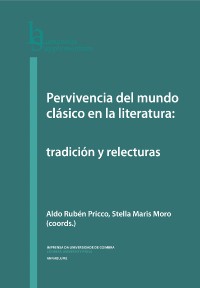Please use this identifier to cite or link to this item:
https://hdl.handle.net/10316.2/90301| Title: | Tiempos y espacios diferentes pero siempre las pasiones humanas | Other Titles: | Different times and cultural places but human passions, always | Authors: | Rojo, Mirta Estela Assis de Fernández, Nilda M. Flawiá de |
Keywords: | Classical tragedy;rewriting;Argentine literature;society;culture;Tragedia clásica;reescritura;literatura argentina;sociedad;cultura | Issue Date: | 2017 | Publisher: | Imprensa da Universidade de Coimbra | Journal: | http://hdl.handle.net/10316.2/42874 | Abstract: | The following research focus the perseverance and new meanings of the
classical literature in argentine authors, through different decades and cultural crisis.
All literatures, as art, write about myths, emotions, meaning structures that are re
writing according new cultural spaces and times. This is the main hipothesis of this
paper. It is a way to “read and write” the own experience into the universal one. A way
to insert one culture in other meanings. In order to confirm this idea, we confront two
different texts David Cureses’s La frontera and Cristian Mittelman’s “Villa Medea”.
Both have the same theme: the fate of passion, the struggle between life and death
when passion blinds human reason. Este trabajo aborda la permanencia así como la resignificación de la literatura clásica grecolatina en diferentes períodos históricos y géneros en el desarrollo de la literatura argentina, especialmente, en el siglo XX. La hipótesis central del trabajo, y en general de nuestros estudios comparatistas, se basa en la afirmación de que toda literatura, en este caso la Argentina, puede (y de hecho lo hace) reelaborar mitos, motivos, estrategias discursivas, estructuras de significación provenientes de la tradición literaria universal – en la que se incluye la grecolatina- para decir lo propio y afirmar su identidad, en un proceso que implica la simbiosis de lo uno con lo otro cultural. Partiendo de este concepto, se tomará como corpus, una obra dramática: La frontera de David Cureses y un cuento contemporáneo: “Villa Medea” de Cristian Mitelman para mostrar las maneras e intencionalidades al intertextualizar raíces culturales grecolatinas, presentes en Medea de Eurípides y Medea de Séneca, dramaturgos griego y romano respectivamente. Con especial énfasis, se pondrán de manifiesto las formas de representación y de relación entre ficción y formas literarias que adopta según los contextos histórico-culturales en los que se inserta. |
URI: | https://hdl.handle.net/10316.2/90301 | ISBN: | 978‑989‑26‑1438‑0 978‑989‑26‑1439‑7 (PDF) |
ISSN: | 2182‑8814 | DOI: | 10.14195/978-989-26-1439-7_20 | Rights: | open access |
| Appears in Collections: | Pervivencia del mundo clásico en la literatura: tradición y relecturas |
Files in This Item:
| File | Description | Size | Format | |
|---|---|---|---|---|
| tiempos_y_espacios_diferentes_pero_siempre_las_pasiones_humanas.pdf | 547.45 kB | Adobe PDF |  |
Items in DSpace are protected by copyright, with all rights reserved, unless otherwise indicated.
